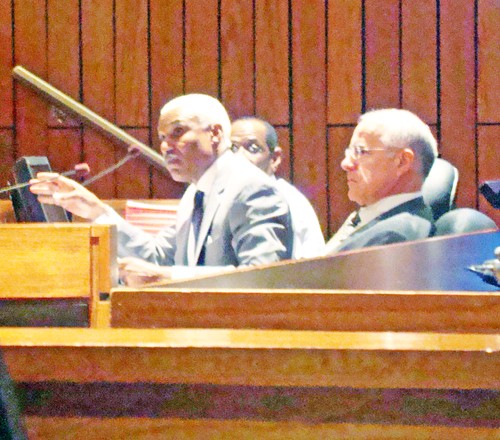What hath Henri Brooks wrought? And then unwrought?
Or maybe those questions should be posed in reverse order.
In any case, what the outspoken and influential county commissioner from
District 2, Position 2 did at the very beginning of Monday’s meeting of the
Shelby County Commission was abstain from voting on the second reading of an
ordinance to redefine five countywide offices.
And a good two hours later what Brooks did was decide she
could vote on that ordinance after all, giving it enough votes finally for the
required super-majority of 9 and putting it on the way to a third reading and
final passage, which means that Shelby County voters will have a chance to
approve the newly recreated and freshly chartered offices of sheriff, trustee,
assessor, county clerk, and register on the November ballot.
All that happened in between was that the 13 commissioners
were forced into yet another vexing and acrimonious recap of all the various
dissents and counter-arguments that had kept the commission from coming to
agreement on what to do about the five offices, which in essence had seen their
constitutionality invalidated by the state Supreme Court in January 2007.
That act, a spinoff of the Court’s ruling on similar
positions in Knox County, forced the commission to recreate the offices under
the county charter. A first compromise effort, which came after literally months
of frenzied disagreement, was put on the August ballot as Ordinance 360 and
narrowly rejected, though a companion measure, Ordinance 361, passed handily.
After the defeat of Ordinance 360, presumably because of a
controversial term-limits provision – a maximum of three four-years terms for
the five officials, plus the mayor and commissioners – the commission bit the
bullet last week and forged two new ordinances for November – one that would
merely recreate the five positions and another that would impose limits
of two four-year terms on the officials.
The second reading on Monday was expected to be routine —
though, given the cantankerousness that has prevailed in previous discussions,
nobody could be 100 per cent certain. And, sure enough, Brooks’ demurrer left
the first resolution short by a vote and put the second one in jeopardy.
The capsule version of what happened next: Every argument
for and against limits of two four-year terms, limits of three four-year terms,
and there being no limits at all was hauled out of storage, dusted off, and
given another hearing – though, as before, agreement proved elusive.
At one point, Commissioner George Flinn seemed to have come
up with a compromise that would have let Shelby Countians vote on one ordinance
that recreated the five jobs with limits of three four-year terms, accompanied
by another resolution limiting the offices to two four-year terms and
superseding the first resolution in that respect.
A majority of the commission seemed ready to vote approval,
but the moment of epiphany dissipated when it came to actual voting. Flinn’s
motion failed, as did another variant, offered by Commissioner Mike Ritz, that
located the two-term provision in the first proposed ordinance and a three-term
provision in the second or “trump” ordinance.
Then, for reasons as unexplained as was her original
abstention, Brooks proposed a re-vote on the original first ordinance, simply
recreating the five positions, and, since she voted for it this time, it got
the necessary nine. Following that, so did the original second resolution,
with its provision for limits on the five officials of two four-year terms.
Not everybody liked the outcome, but most commissioners
acknowledged afterward that the two ordinances, submitted to the voters in
November as referenda, had good chances for passage.
In other significant actions, the commission rejected a
proposal for out-sourcing food services for the Division of Corrections to a
private corporation and approved a long-pending salary adjustment upward for
sheriff’s deputies at or below the rank of lieutenant.
 jb
jb
County mayor A C Wharton argued reluctantly — and unsuccessfully — on Monday for passage of a proposal to out-source food services for county prisoners.